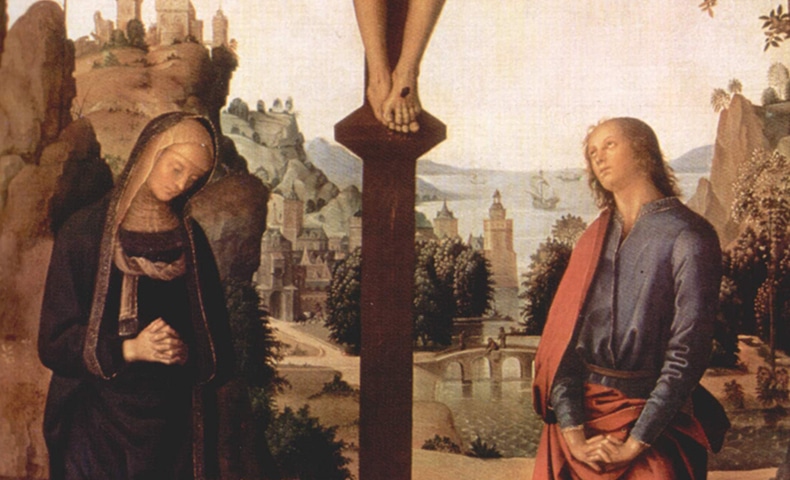December 27
[color=var(--e-global-color-text)]Image: Detail of the central panel of a triptych | Crucifixion with the Virgin and St. John | Pietro Perugino | photo by The Yorck Project[/font][/color]
[/size][/b]
Saint John the Evangelist’s StoryIt is God who calls; human beings answer. The vocation of John and his brother James is stated very simply in the Gospels, along with that of Peter and his brother Andrew: Jesus called them; they followed. The absoluteness of their response is indicated by the account. James and John “were in a boat, with their father Zebedee, mending their nets. He called them, and immediately they left their boat and their father and followed him” (Matthew 4:21b-22).
For the three former fishermen—Peter, James and John—that faith was to be rewarded by a special friendship with Jesus. They alone were privileged to be present at the Transfiguration, the raising of the daughter of Jairus and the agony in Gethsemane. But John’s friendship was even more special. Tradition assigns to him the Fourth Gospel, although most modern Scripture scholars think it unlikely that the apostle and the evangelist are the same person.
John’s own Gospel refers to him as “the disciple whom Jesus loved” (see John 13:23; 19:26; 20:2), the one who reclined next to Jesus at the Last Supper, and the one to whom Jesus gave the exquisite honor of caring for his mother, as John stood beneath the cross. “Woman, behold your son…. Behold, your mother” (John 19:26b, 27b).
Because of the depth of his Gospel, John is usually thought of as the eagle of theology, soaring in high regions that other writers did not enter. But the ever-frank Gospels reveal some very human traits. Jesus gave James and John the nickname, “sons of thunder.” While it is difficult to know exactly what this meant, a clue is given in two incidents.
In the first, as Matthew tells it, their mother asked that they might sit in the places of honor in Jesus’ kingdom—one on his right hand, one on his left. When Jesus asked them if they could drink the cup he would drink and be baptized with his baptism of pain, they blithely answered, “We can!” Jesus said that they would indeed share his cup, but that sitting at his right hand was not his to give. It was for those to whom it had been reserved by the Father. The other apostles were indignant at the mistaken ambition of the brothers, and Jesus took the occasion to teach them the true nature of authority: “…[W]hoever wishes to be first among you shall be your slave. Just so, the Son of Man did not come to be served but to serve and to give his life as a ransom for many” (Matthew 20:27-28).
On another occasion, the “sons of thunder” asked Jesus if they should not call down fire from heaven upon the inhospitable Samaritans, who would not welcome Jesus because he was on his way to Jerusalem. But Jesus “turned and rebuked them” (see Luke 9:51-55).
On the first Easter, Mary Magdalene “ran and went to Simon Peter and to the other disciple whom Jesus loved, and told them, ‘They have taken the Lord from the tomb, and we don’t know where they put him’” (John 20:2). John recalls, perhaps with a smile, that he and Peter ran side by side, but then “the other disciple ran faster than Peter and arrived at the tomb first” (John 20:4b). He did not enter, but waited for Peter and let him go in first. “Then the other disciple also went in, the one who had arrived at the tomb first, and he saw and believed” (John 20:8).
John was with Peter when the first great miracle after the Resurrection took place—the cure of the man crippled from birth—which led to their spending the night in jail together. The mysterious experience of the Resurrection is perhaps best contained in the words of Acts: “Observing the boldness of Peter and John and perceiving them to be uneducated, ordinary men, they [the questioners] were amazed, and they recognized them as the companions of Jesus” (Acts 4:13).
The Apostle John is traditionally considered the author also of three New Testament letters and the Book of Revelation. His Gospel is a very personal account. He sees the glorious and divine Jesus already in the incidents of his mortal life. At the Last Supper, John’s Jesus speaks as if he were already in heaven. John’s is the Gospel of Jesus’ glory.